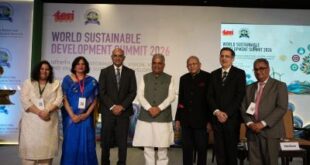New Delhi, March 11: Chief Minister of Sikkim PS Tamang unveiled a new chapter in educational infrastructure today with the inauguration of the impressive Academic Blocks ‘GYAN KUNJ’ at Sanchaman Limboo Degree College (SMLGDC), Gyalshing.
Shri PS Tamang spoke about the government’s unwavering commitment to advancing education and empowering the youth of Sikkim. He commended the collaborative efforts of all stakeholders involved in realizing this transformative project within the span of three years.
The Chief Minister Tamang made several significant announcements aimed at further enhancing the quality of education in the region. These announcements include renaming the institution as the Sanchaman Limboo Government Degree College, ‘Arigoan’, Gyalshing, and the introduction of a ‘Science Stream’ and a ‘Bachelor’s Degree in Physical Education’ from the upcoming academic session. Furthermore, he assured the regularization of left-out lecturers under the four-year regularization provision.
Highlighting the importance of exposure trips for both teaching faculties and students, Chief Minister Tamang announced plans for international trips for teaching faculties and domestic tours for students within India. He underscored the government’s commitment to providing first-class infrastructure for higher education. He also informed that the project had been completed with an estimated cost of Rs 99.53 crore.
In a symbolic gesture, Chief Minister Tamang officially handed over the infrastructure of the college to the college community and people of Sikkim, urging them to take ownership and ensure its responsible care.
The newly inaugurated building, spanning a total built-up area of 154501.13 square feet, marks a significant milestone in the development of the college. It boasts 36 spacious classrooms, equipped with modern amenities to facilitate an enriching learning environment. Complementing the academic spaces are 12 laboratories, designed to foster innovation and hands-on learning experiences for students across various disciplines.
In addition to academic facilities, the new infrastructure includes a digital seminar hall, four seminar halls, and one conference hall serving as venues for intellectual discourse, cultural events, and academic gatherings. These spaces are poised to become hubs of collaborative learning and knowledge exchange, contributing to the holistic development of the college community.
Recognizing the importance of holistic student support, the new building also houses a range of support services tailored to meet the needs of students and faculty members alike. The college has a special facility of ramps and rails with wheel chairs for the differently abled students, along with a lift and a fully equipped firefighting system.
Earlier, CM PS Tamang also inaugurated
the newly constructed three storeyed Police Station in Gyalshing, signifying the importance of enhancing law enforcement infrastructure in the region.
The newly constructed police station is equipped with modern facilities and amenities to support the police force in carrying out their duties effectively. It is strategically located to cater to the needs of the local community and neighboring areas, aiming to strengthen law enforcement efforts and improve response times to emergencies.
Chief Minister Tamang expressed his gratitude to the police force for their unwavering dedication and commitment to maintaining law and order. He reiterated the government’s pledge to continue investing in infrastructure and resources to empower law enforcement agencies and uphold the rule of law.
The Chief Minister also participated in the virtual launch of the Buddhist Development Programme from Sanchaman Limboo Government Degree College today.
Union Minister for Minority Affairs, Smriti Zubin Irani, virtually laid the foundation stone for projects under the Pradhan Mantri Jan Vikas Karyakam of the Ministry of Minority Affairs as part of the Buddhist Development Plan from New Delhi.
During the virtual inauguration, Chief Minister Tamang was accompanied by John Barla, Union Minister for Women & Child Development, Ministry of Minority Affairs,
Sanjit Kharel, State Minister of Social Welfare, Buildings & Housing, and Women & Child Development. Also in attendance were Sarika Pradhan, Secretary of the Social Welfare department, officials of DAC Gyalshing, monks, and members of Sangha.
The Buddhist Development Plan (BDP) aims to enhance the socio-economic development of the Buddhist population across the country.
Initially launched in five states/UTs including Himachal Pradesh, Uttarakhand, Arunachal Pradesh, Sikkim, and Ladakh, the Government of India, through the Ministry of Minority Affairs, has approved a total of 38 projects in these regions, with ten projects allocated to Sikkim, totaling Rs 43.98 crores.
The projects in Sikkim include infrastructure development such as classrooms and hostels for monastic schools in Pemayangtse, Enchey, Assam Lingzey, Upper Ghurpisey, Sichey, Karthok, Lower Shreebadam, Boomtar, Teendharey Bhasmey, and Martam.
These projects aim to provide improved facilities for Buddhist monks studying in these monastic schools, offering both theological and secular education.
Later in the day, the CM inaugurated the much-awaited Kyongsha Stadium and Indoor Gymnasium hall at Gyalshing marking a significant milestone in the advancement of sports infrastructure in the region.
The Kyongsha Stadium and Indoor Gymnasium hall with an estimated project cost of Rs. 33 crore, stands as a testament to the commitment of the state government towards promoting sports and providing world-class facilities for athletes and enthusiasts alike. Its state-of-the-art amenities are set to elevate the sporting experience for both players and spectators.
Additionally, the Indoor Stadium boasts modern facilities including two badminton courts, a Taekwondo hall, a gymnasium, and a Boxing club. This indoor stadium is designed to cater to a diverse range of sports and activities, fostering a culture of fitness and wellness in the community.
The completion of these projects not only fulfills a long-pending demand but also underscores the government’s dedication to enhancing the sports infrastructure across the state. The inclusion of diverse sporting facilities is expected to attract both seasoned athletes and beginners, paving the way for improved performance and greater sporting achievements.
 Newspatrolling.com News cum Content Syndication Portal Online
Newspatrolling.com News cum Content Syndication Portal Online






